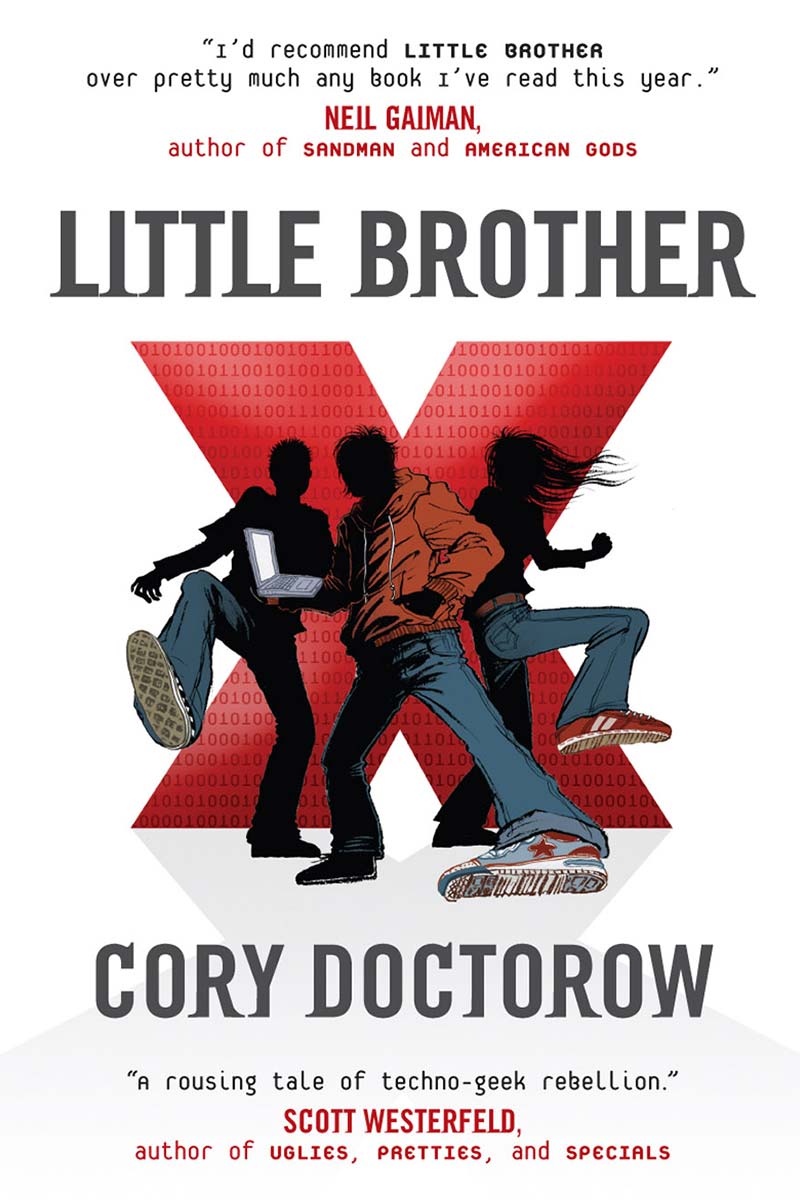
James Scot Brodie is a teacher at Presidio Middle School in San Francisco, where Jen Wang and I spoke last month on our tour for In Real Life; prior to my arriving, he assigned my book Little Brother to his students, and produced some curricular materials that he’s generously given to me to publish.
Little Brother Portfolio | Little Brother Acronym Challenge | Little Brother Biography project
He writes,
I was thrilled when the librarian announced that Cory Doctorow was going to make an appearance at our school. As an English teacher, aspiring writer, and complete nerd — I find author visits a nice perk to the job. The students too, like to get out of the classroom whenever they can and author visits are a rare treat. I’ve been teaching for about five years and I’ve met two authors. It then dawned on me that we seldom read the books of the authors that come to visit our school. Mainly because our closets are filled with tons of dead people. Maybe five percent of our class sets are from the living, although Mr. Gomez somehow scored 40 copies of The Fault In Our Stars (he must know someone).
Nevertheless, it was early September and Doctorow was set to visit on October 16. I was determined to have my students read the book, but we only had ten copies from a box on loan from the public library. Now, Doctorow is super generous with his stuff and offers a lot of material to educators and students for free via his website, so I figured I would tap into this and download the book. At the same time I didn’t want to print up 102 copies for my 3 English classes. That would take forever, cost a lot, and kill too many trees. So, long story short, this is what I did: I purchased the audio book, and two copies of the text. I read the book, making “marginal” and underlining vocabulary words, slowly sculpting it into a “teacher’s edition.” I also came up with questions for each chapter. Most the questions are simple guided questions (who, what, when, where and why), but I also made sure that each chapter has a question where the students can relate the reading to their own lives — these inquiries were also great springboards for interesting classroom discussions. I printed up these sheets and students completed them as we listened to the audio book. This is where the second book comes into play – I used the unmarked version of the text to display on the white board at the front of the class via my ELMO projector for all the class to see. I was surprised at how huge I could get the book — it was roughly four feet by six feet and I didn’t know this but the little orange button on the left is for focusing (a student pointed this out to me). I’ll have to say it was one of the most positive reading experiences I’ve ever had with a class. It may be psychological but the minute I projected the book on the board and hit the play button on the audio book — students were enthralled as if watching a movie. Of course it may also have something to do with Mr. Doctorow’s book — there is a lot in there that the modern day teenager can relate to.
The entire unit took about six weeks. Students gathered all their vocabulary/question sheets into a portfolio. I purchased card stock and brass fasteners for students to make covers for these portfolios (which they decorated themselves) and this turned out to be a great boon for students that couldn’t afford to purchase their own copies of the book, because when the big day came — Doctorow autographed copies for his admirers. And this is how the lesson plan ended up here, Cory signed a few, thought they were cool and offered to post them. There are a couple of other activities that I’ve thrown in, but the above is the real meat and potatoes. Use them as you like, put your own personal spin on them and hopefully it will save you some time.
James Scot Brodie
English Teacher
SFUSD

































